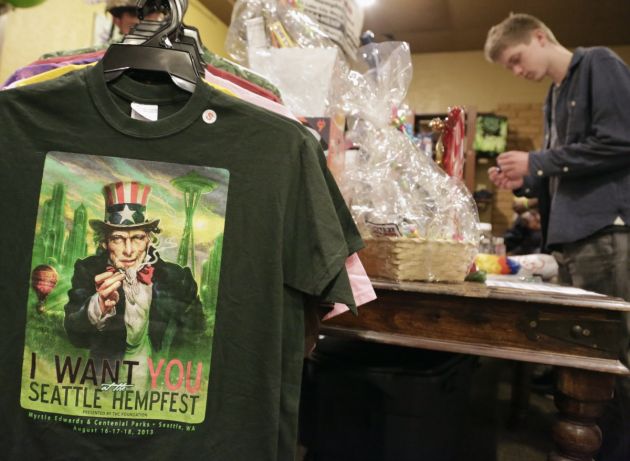A majority of Christians say no to recreational pot, US survey finds

A new survey by the Barna Group finds that the tide may be turning toward legalization of recreational marijuana use, but not among Christians.
A majority of Americans (58 percent) now favor legalizing marijuana for recreational or other use.
"This scale has tipped for almost all groups - the exceptions being among Christians and those over the age of 64, among which a majority still believe recreational marijuana should be kept illegal," the survey released Tuesday finds.
It notes that two U.S. states, Washington and Colorado, have this year legalized marijuana not only for medical use but also for recreational users.
A majority of voters in those states approved ballot measures to decriminalize growing, selling and using marijuana and to tax and regulate the pot industry just as the alcoholic beverage industry is taxed and regulated.
More than 10 other states may follow suit with similar ballot measures in upcoming elections.
In its new nationwide study, Barna Group asked Christian and non-Christian adults 18 and older their views on the legal and moral acceptability of marijuana.
Men (63 percent) are more likely than women (53 percent) to favor legalization, as are people who do not have children under 18 (60 percent, compared to 54 percent of those with children younger than 18).
Generally, people with higher incomes and some college education tend to favor legalization at higher rates than those with lower incomes and less education.
White Americans are slightly more likely than black Americans to have used marijuana in their lifetime (52 percent against 49 percent), black Americans are more likely to favor legalizing it (65 percent to 57 percent).
PRACTICING CHRISTIANS OPPOSE LEGALIZATION
Running against the broadening cultural mainstream, most practicing Christians oppose legalization.
"Even mainline Protestants, who often trend more liberal on social issues than their Catholic and non-mainline brethren, are less likely (45 percent) than the national average to say pot should be legal in the U.S.
"Non-mainline Protestants (32 percent) and Catholics (39 percent) are far less likely to favor legalization than the general American population."
Those who believe pot is morally acceptable are still in the minority, but the current numbers represent a significant increase over the past decade the survey finds.
In 2001, Barna Group asked practicing Protestants and Catholics if they believed non-medical use of marijuana was morally acceptable.
At that time only 9 percent of Protestants approved, compared with 19 percent in 2014; 17 percent of Catholics approved in 2001, compared with 33 percent today.
The general public has shifted, as well. In 2001, 25 percent of adults said non-medical pot was morally acceptable; by 2014, that proportion increased to 47 percent.
"There is a clear trend toward greater cultural acceptance of recreational marijuana, even among many practicing Christians," said David Kinnaman, president of Barna Group and director of the study.
"National surveys are a great way to find out what people think and how their perspectives have changed over time. But why those changes are happening is more difficult to pin down through conventional polling.
The survey concludes that the United States continues to "shift from a culture that values abstinence to one that focuses on experience."
"Marijuana use fits within a larger trend of liberalizing views and behaviors when it comes to activities like gambling, pre-marital or extra-marital sex, and drinking. As attitudes toward temptations shift, Americans increasingly define the 'pursuit of happiness' to include personally invigorating or even escapist experiences," says Kinnaman.
